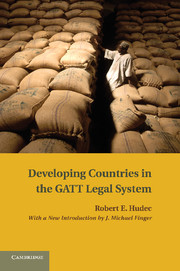Introduction to the New Edition
Published online by Cambridge University Press: 03 May 2011
Summary
The history of GATT's relationship with developing countries began with what Robert E. Hudec describes as “a legal relationship based essentially on parity of obligation” {24}. Yet as the GATT system evolved it increasingly left developing countries outside of the momentum towards liberalization that the negotiations built up among developed countries and exempted them from the general though imperfect sense of discipline that developed countries came to accept. From GATT's beginning through the mid-1980s – the period Hudec studied – the identity of developing countries in the system became almost entirely a matter of their demanding non-reciprocal and preferential treatment and developed countries responding grudgingly to those demands.
The result was a relationship that Hudec describes as “form without substance”. {99}
In form, the relationship was extensively elaborated:
After years of debate and of gradual compromising, all the key ideas advanced by developing countries – non-reciprocity, preferences, special and differential treatment – were accepted at the formal level during the 1970s. They now appear in several GATT legal texts and in countless declarations. {155}
These expressions did not, however, have the force of international law obligation. The commitments were compromised by language such as “The developed countries shall to the fullest extent possible – that is, except where compelling reasons, which may include legal reasons, make it impossible, …”
- Type
- Chapter
- Information
- Developing Countries in the GATT Legal System , pp. 1 - 22Publisher: Cambridge University PressPrint publication year: 2010



